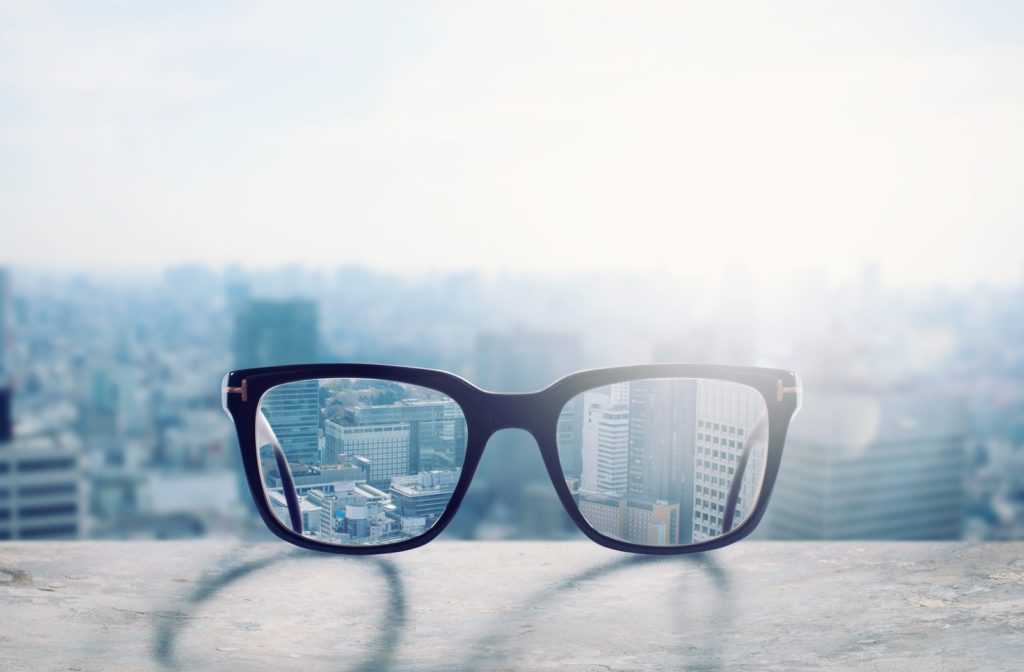Ever heard that wearing glasses every day can actually make your vision worse? There are some schools of thought that promoted this notion over the last few decades. But modern science and several studies have told us there is no relationship between wearing glasses and vision decline.
It’s very natural for your vision to decline as you age, And if you normally wear glasses, this may seem like a potential cause for worsening eyesight. But the truth is, modern optometry considers this a complete myth.
All that being said, updating your vision prescription and replacing your lenses are necessary to keep up with aging eyes, especially over the age of 50. Regular comprehensive eye exams are important if you want to wear glasses that fully correct your vision.
Let’s explore why exactly we wear glasses and what they do to help our eyesight. We’ll debunk any thoughts about spectacles making your eyes worse.
Why Do People Wear Glasses?
Well, the short answer is pretty straightforward: because they can’t see. But why can’t you see clearly? It often has to do with an abnormality in the way your eye focuses light. This causes images to appear blurry and makes it hard to focus.
People wear glasses to correct refractive errors. When light bends through the cornea and reaches the retina, it is refracting through the eye. This process requires precise accuracy from many of the eyes functions. When calibrations are off, it makes your vision blurry.
There are several refractive errors, but 2 are more common reasons people wear eyeglasses.
Nearsightedness (Myopia)
Myopia is a vision condition that prevents distant objects from coming into focus properly. Also known as nearsightedness, people with this refractive error have little trouble seeing things near. This occurs when the eyeball is longer than normal or the cornea has too much curvature.
People with myopia wear glasses to see better at a distance. Many nearsightedness patients wear glasses or contacts throughout the day. Myopia is common, affecting about 30% of Canadians.
Farsightedness (Hyperopia)
Farsightedness is an eye condition that makes it difficult to focus on things that are near. Also called hyperopia, this refractive error occurs when the eye is too short or cornea curvature is too little.
May people with hyperopia only wear glasses for near-work activities, such as reading or computer use. But not using corrective eyewear can lead to fatigue and discomfort if you are farsighted.

Why Does My Vision Get Worse?
Most people’s eyes stop changing shape about the age of 20. That’s why it’s usually recommended you wait until that age before getting laser eye surgery. Even though it’s common for eyes to stop growing at this age, there are exceptions.
Astigmatism, for example, is a vision condition that describes an irregular curvature of the eye. This can continue to develop well into adulthood and needs to be monitored closely to keep your prescription relevant.
Your vision is a complicated and sensitive system that can be influenced by many factors. Wearing glasses is the least of things that can make it harder to see and focus.
Risk Factors for Declining Vision
Getting older means adjusting to changes in your body. Joints get painful, muscles shrink, and your vision can regress, too. Staying aware of lifestyle changes and other health concerns helps you understand why your vision isn’t what it used to be.
Reasons for poor eyesight are vast, but they do NOT include wearing glasses. Here are some of the causes that optometrists have linked to declining vision:
- Aging
- Eye injuries or trauma
- Long-term sun exposure
- Inherited disorder (myopia)
- Diabetes
- Macular degeneration
- Cataracts
- Glaucoma
Myopia in Children
The first signs of myopia can be detected as early as the age of 3. For some children, wearing corrective eyewear will be necessary at a young age. Children often experience more variance in their vision as the years pass when compared to adults.
Some outdated and disproven theories had claimed children wearing corrective eyewear would experience more rapidly declining vision. This is not true. All of these theories have been firmly disputed by quantitative studies.
Groundbreaking Myopia Control
Wearing glasses with a proper prescription will not make your child’s vision worse. And some welcome developments in lens technology have been shown to slow down myopia in children.
Specialty myopia slowing contact lenses have been approved for children’s use. They are designed to slow the elongation of a child’s developing eyeball. These lenses may not work for every child, but discuss myopia control with your optometrist during your child’s next eye exam.
Monitor Changes Regularly
Wearing glasses won’t make your vision worse. But wearing glasses that aren’t strong enough for your refractive error will make it hard to see clearly! You may not need a new prescription every year, or even every few years, but routine eye exams make sure you’re never squinting through your spectacles. Underlying eye conditions and health risks can also be affecting your vision, making your eyes worse. Eye exams give your optometrist the ability to flag these things early if they are undiagnosed. So keep your glasses on, and know that correcting your vision with eyewear is never a culprit if your vision needs some extra help as you age.



